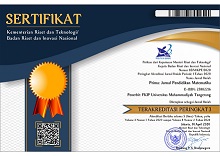MATHEMATICAL PROBLEM SOLVING ABILITY TO DEVELOP NUMERICAL LITERACY IN ELEMENTARY SCHOOL STUDENTS
Abstract
Mathematical problem solving ability has a close relationship in developing literacy and numeracy in elementary schools. The purpose of this study was to describe mathematical problem solving abilities to develop literacy and describe mathematical problem solving abilities to develop numeracy in elementary schools. This research was carried out in class V SD Negeri Sibela Timur Surakarta City to students with a total of 3 students. The method used in this research is descriptive qualitative research method. Data collection was carried out with tests and documentation. The results of this study indicate that the ability of students to solve mathematical problems is different. Of the 3 students, 1 student has the ability to solve math problems in the good category, 1 student in the medium category, and 1 student in the low category. Mathematical problem solving ability is in line with the results of giving literacy and numeracy questions. Students in the good category get high literacy and numeracy test scores, students in the moderate category get sufficient test scores, and students in the low category get low literacy and numeracy test scores.
Keywords
Full Text:
PDFReferences
Apriadi, M. A., Elindra, R., & Harahap, M. S. (2021). Matematis Siswa Sebelum Dan Sesudah Masa Pandemi Covid-19. Jurnal MathEdu, 4(1), 133–144.
Khairunnisa, G. F., Maulyda, M. A., Annizar, A. M., & Hijriani, L. (2020). Mathematics communication : translation of Elementary students ’ idea. NUMERICAL: Jurnal Matematika Dan Pendidikan Matematika, 4(2), 77–86.
Maghfiroh, F. L., Amin, S. M., Ibrahim, M., & Hartatik, S. (2021). Keefektifan Pendekatan Pendidikan Matematika Realistik Indonesia terhadap Kemampuan Literasi Numerasi Siswa di Sekolah Dasar. Jurnal Basicedu, 5(5), 3342–3351.
Novalia, Y., & Panjaitan, D. J. (2021). Analisis kemampuan pemecahan masalah dan aktivitas belajar matematika pada pembelajaran berbasis masalah. Maju, 8(2), 493–501.
Rahmawati, A. N. (2021). Analisis Kemampuan Literasi Numerasi Pada Siswa Kelas 5 Sekolah Dasar. … Matematika Dan Nilai-Nilai Islami), 4(1), 59–65. http://conferences.uin-malang.ac.id/index.php/SIMANIS/article/view/1502%0Ahttp://conferences.uin-malang.ac.id/index.php/SIMANIS/article/download/1502/725
Salsabilla, I., & Hidayati, Y. M. (2021). Kemampuan Literasi Matematika Siswa Kelas V Dalam Menyelesaikan Soal Matematika Tipe Higher Order Thinking Skills (Hots). JKPD (Jurnal Kajian Pendidikan Dasar), 6(1), 92–107.
Salvia, N. Z., Sabrina, F. P., & Maula, I. (2022). Analisis kemampuan literasi numerasi peserta didik ditinjau dari kecemasan matematika.
Saputri, S. V., Dayanti, N., Sari, R. K., Sartika, R. P., & Hadi, L. (2022). DEVELOPMENT OF CRITICAL THINKING ABILITY ORIENTED TEXTBOOK ON ELECTROLYTE AND NON-ELECTROLYTE SOLUTION MATERIALS. Jurnal Pendidikan Matematika Dan IPA, 13, 154–162.
Winarso, W., Wahid, S., & Rizkiah, R. (2022). Type of Error in Completing Mathematical Problem Based on Newman’S Error Analysis (Nea) and Polya Theory. Jurnal Pendidikan Matematika Dan IPA, 13(1), 51. https://doi.org/10.26418/jpmipa.v13i1.44765
DOI: http://dx.doi.org/10.31000/prima.v6i2.6142
Article Metrics
Abstract - 1569 PDF - 1257Refbacks
- There are currently no refbacks.
Prima: Jurnal Pendidikan Matematika
Program Studi Pendidikan Matematika
Fakultas Keguruan dan Ilmu Pendidikan
Universitas Muhammadiyah Tangerang
Jl. Perintis Kemerdekaan I/33, Cikokol
Kota Tangerang, Indonesia
e-mail: primajpm@gmail.com
Prima: Jurnal Pendidikan Matematika (p-ISSN: 2579-9827 | e-ISSN: 2580-2216) is licensed under a Creative Commons Attribution 4.0 International License.







